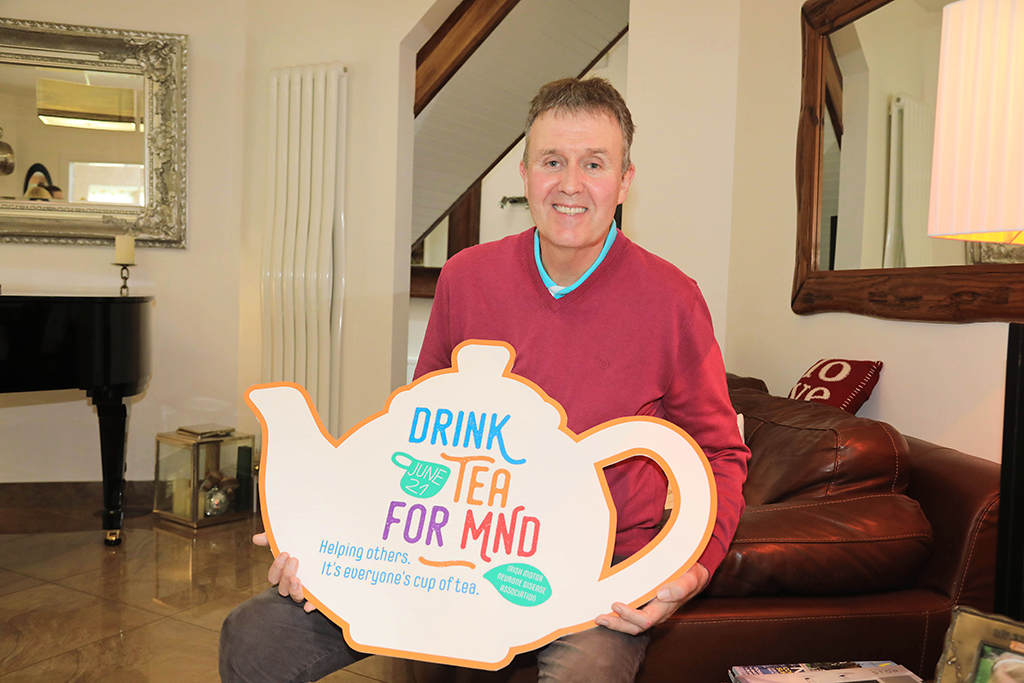Musician reveals his MND battle
Dublin People 07 Jun 2019
MUSICIAN Roy Taylor has vowed to defy expectations by beating Motor Neurone Disease.
The Crumlin native was diagnosed with the progressive neurological condition just over one year ago. Roy is best known as the singer and bass player with popular band, Jump the Gun, who famously represented Ireland in the Eurovision Song Contest in 1988 with their song, ‘Take Him Home’.
Despite his shock diagnosis, Roy is now putting all his energy into raising funds and awareness for the Irish Motor Neurone Disease Association (IMNDA). He is the ambassador for this year’s ‘Drink Tea for MND’ campaign, which runs throughout the month of June.
Roy (6), a father of four children ranging in age from 10 to 34, went for numerous medical tests when he started to lose weight and suffer from fatigue. However, all the results came back normal and it was only when he went down the neurological route that he received his heartbreaking diagnosis.
“I was in disbelief, I was numb,” recalls Roy. “The first question I asked was: ‘How long have I got?’”
After the initial shock of the news, Roy decided that he wasn’t going to let MND beat him and has thrown his energy and musical talent into raising funds for medical research into the condition.
“I have an unusual attitude in that I don’t accept the normal prognosis associated with Motor Neurone Disease,” Roy told Southside People. “I’m just not giving into it, simple as that.”
He believes that lack of funding is the single greatest barrier to finding an effective treatment for MND – a breakthrough that could be as close as two to three years away.
Roy is blessed to have the incredible support of his wife, Lisa, and four children, who – like their father – are all talented musicians.
“The positivity in my house is unbelievable,” Roy revealed. “Staying positive is key when you are diagnosed with a life changing condition. I’ve personally done a deal with MND – I’m willing to take the knocks and setbacks that come with it but there is a line I don’t want to cross.”
Despite his positivity, Roy admits to some tough days.
“I worry about not being around for my children and grandchildren,” he says. “I’ve one leg and one arm that are much weaker now and I’ve problems breathing. Going upstairs is really difficult for me.”
It has also affected his music.
“Unfortunately, I had to stop playing bass last October. But I still sing – I sit on a stool because I’ve respiratory problems.”
Roy has written a new charity single, which will be released in the coming weeks, entitled ‘Watch Your Back MND’.
“It’s a really big production with swing beat similar to what you’d get with a Frank Sinatra song,” Roy explains. “The message of the song is that I’m taking MND head on and it’s in for one hell of a fight.”
Roy is asking the public to Drink Tea for MND this month to help provide essential services to more than 370 families right across Ireland affected by the disease.
He adds: “Despite the huge challenge of living with a distressing illness that may end my life early, when I hear of Irish people gathering and having fun over a tea or coffee – to help people like me and our extraordinary care-givers – it brings joy to my heart. You have no idea how much it means to us.”
To organise your own event in or around June 21, all you have to do is visit imnda.ie and they’ll send you a free fundraising tea pack, which is proudly supported by SuperValu.
For more information on organising a tea day, just email fundraising@imnda.ie or Freephone 1800 403 403.
If you can’t organise a tea day, you can text MND to 50300 and donate €2.
The IMNDA provides specialised services for people affected by this debilitating disease such as equipment on loan, financial assistance towards home help, advice and home visits by an MND nurse.
In order to provide these vital services, the IMNDA depends heavily on the generosity of the public and supporters of the association who generate over 83 percent of its income.
There are currently more than 370 people living with Motor Neurone Disease in Ireland. It is often referred to as the 1,000-day disease as most people die within this period of being diagnosed. One person dies every three days from MND.
- Musician reveals his MND battle












